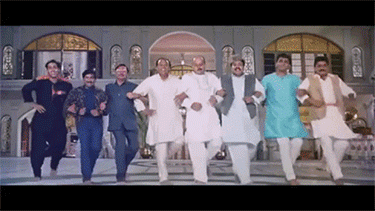Hello ji,
First of all, a warm welcome to all the new readers who have joined us for the first time this week!
Since my appearance on The Seen and the Unseen last week, I have been flooded with kind comments, feedback, and - true to the Amit Varma fanbase - links to some amazing books.
Also thanks to the podcast, there is an unusually large number of readers who are getting this email for the first time today.
After a sudden boost in subscriptions, it is customary for newsletter writers to welcome new readers with a re-introduction. But all of this week’s new readers have come after listening to a six-hour-long introduction to Womaning, so I am going to jump right in.
The Idli Adulation
Gather round, children, as we journey back in time.
The year is 2014. Just married, Mister and I are in the process of converting a newly-allocated sarkaari flat into a home.
The flat had intermittent electricity, second-hand pieces of broken furniture, and kitchen walls covered in the sticky gunk of the previous occupants’ cooking.
We might have been in the honeymoon phase of our marriage, but the Central Public Works Department had clearly not got the memo.
Mister and I were still scrubbing our predecessor family’s DNA off the walls and floors when we got the good news: We were to receive our first house guests soon.
Our days of eating ordered Chinese on the floor were clearly over.
Uncle and Aunty would expect home-cooked meals. We quickly bought an induction choolah, some basic utensils, and other motley supplies to put together a barebones cooking setup. We had not had time to hire help yet, and romanticized doing it all by ourselves - how very ye tera ghar ye mera ghar of us.
However, once the guests arrived, we found ourselves stuck - not in a romantic movie, but in a cliché as old as time: Mister would be out in the hall entertaining the guests, while I would be standing for hours in the kitchen - trying to figure out the intricate science of cooking 3 dishes on one stove and somehow serving them all in one temperature bracket.
You cook the rotis, and the dal gets cold.
You warm up the dal, and the bhindi gets cold.
You somehow put the food on the table, but Uncle is still finishing his drink, so the rotis turns to vulcanized rubber.
I recall being more exhausted this week than I had been in a long time. My feet would be in agony after all those hours of standing in the kitchen, and I would sometimes go to bed crying due to sheer exhaustion.
In this period, I thought a lot about how my mother lived this life every day - thankless labour for thankless benefactors. I called her and just wept.
As I choked on my words of gratitude, my mother actually started laughing. She thought I was pranking her, and asked me to tell her what I really wanted to talk about.
Just a friendly reminder of how little appreciation I sent her way all my life.
Meanwhile, Mister saw all this Punjabi drama unfold and felt for me.
The next day, he decided to let me sleep in and make breakfast himself.
We had this MTR idli pack which just had to be mixed with some curd and popped in the microwave to pack idlis (steamed rice cakes).
Chutneys and sambhars and other accompaniments were well beyond his culinary abilities so he wisely kept his ambitions modest and stuck to just the idlis.
It maybe took him fifteen minutes to make the entire thing.
Sixteen minutes later, I woke up to a ruckus.
Feeling guilty for oversleeping, I went out into the hall and saw that Uncle was talking loudly on a family video call. Cousins and second cousins from all timezones on the planet were connected and the atmosphere was jubilant.
I thought maybe someone in the family announced a marriage. Or had a baby. Or cured cancer (by the sound of it).
But then, I realized that Uncle was filming the idlis on the table and shouting at his virtual audience:
“Look! Look at this! He has made idlis for us today - all by himself!”
Everyone on the call displayed an enthusiasm that rivaled Uncle’s. They insisted on the idli darshan, again and again, and asked probing follow-up questions like how did he manage to make the idlis so white.
Mister tried to mumble something about the MTR Ready-To-Cook pack, but he was shushed and told to not be so modest about this path-breaking achievement.
Children, it is 2022 as I write this.
Mister and I have been a couple for 10 years now, married for 8. We have seen many milestones over these years - new jobs, new cities, successes, failures, a child, (a podcast, heh).
But Uncle still calls us sometimes to reminisce about them historic idlis.
The Halwa Honour
When Smita was expecting her first child, she would get intense swelling in her feet.
“One day, our cook did not turn up and I was in too much pain to stand in the kitchen and prepare a meal. I asked my husband for help. He decided that the best he could do would be a single dish - sooji ka halwa (a dessert made by simply roasting semolina in clarified butter and adding sugar).”
Before the halwa appeared on her plate, however, a message appeared on her phone.
“This was the first - and only - time my husband has cooked in our marriage so far. Apparently, he had decided to mark the occasion by shooting an entire video of him cooking the halwa, and then sending it to the family group.”
Smita could not help but laugh at the absurdity of chronicling such a basic task.
“I found it hilarious that he saw cooking one simple dessert as such a momentous occasion. I told him that we will have to keep this video for posterity - to show our unborn children and grandchildren in the future what a Masterchef their father/grandfather was! We both had a good laugh about it.
But there was something else.
Our family WhatsApp group is full of women who have been cooking all day, every day, their entire life, for entire families. I have never seen even one of them being appreciated for a single meal she had prepared - not even when they managed to superhumanly cook four-course meals for dozens of people on festivals and special occasions.
But the group did not stop buzzing with appreciations for that halwa all day!”
The Rice Recognition
Shweta is a breastfeeding mother, who lives with her in-laws.
“Breastfeeding comes with a thousand challenges. The sheer number of hours you have to do it, the pumping, checking again and again if the baby is hungry, sometimes formula feeding, and making sure you drink a ton of water and even eat extra calories - and then there are another thousand caregiving tasks beyond breastfeeding.
I was constantly sleep-deprived and just barely keeping my head above the water in this phase.”
On top of all her motherhood responsibilities, Shweta was also still handling the day-to-day mental load of running the house.
“The last thing I wanted to have on my mind at this time was what groceries to order, and what household supplies we are running out of. Still, I had to do it all. I was also the one stuck with the task of tracking and paying all the grocery bills, internet bill, gas bill, salaries of domestic help, electricity bill - even the Netflix bill!”
One day, Shweta decided to confront her husband about being overburdened.
“India does not have a Paternity Leave policy so he had to go to work, which I understood. But one day, I completely reached the end of my patience, and told my husband, ‘Tum bhi kabhi kuch kar lia karo. (You should also pitch in sometimes.) It is difficult for me to take stock of all the items in the house and what is running out in the kitchen, in the bathroom, in the cleaning supplies, etc etc. Ordering stuff or paying a bill on an app maybe a small thing for you, but not having to keep track of all these things will be a huge burden off for me. Can you take over at least this?’”
Shweta’s father-in-law overheard this conversation and immediately jumped in to his son’s defence.
“Now, my father-in-law does not know the first thing about breastfeeding, let alone the physical and emotional challenges I was facing on this journey.
My baby had not been latching well. As a result, my breasts would become painfully engorged and I would scream in agony every time I tried to feed the baby. I felt crushing guilt because my baby was always hungry, no matter how many hours I tried to get him to latch.
These are not issues discussed in ‘polite’ Indian families, so men mostly have no clue about them. That doesn’t stop them from mansplaining your life to you, of course.
My father-in-law reminded me that one time his son had ordered some rice when the house had run out and I was at the hospital, delivering the baby. He said, ‘See, he does enough around the house. You are complaining for no reason!’”
The Burp Applause (burpplause?)
Right around the time Rachna gave birth to their child, her husband started a new job.
“He accepted an offer for a demanding job right before our baby was born. I was left all alone to manage the baby, as well as my ailing mother-in-law who was a cancer survivor, newly in remission. I had limited hired help due to the pandemic. So when my Maternity Leave ended, I realized that I was not in a position to join the workforce just yet, and had to quit my job.”
Rachna’s husband was vehemently against this choice.
“I did not have a moment’s rest in my day. Yet, he would come back from his work and start pushing me to look for a job. Even on family calls, he would put me in a spot in front of Uncles and Aunts, asking them to nudge me to start working again. Of course, there was no recognition that I was already working harder than anyone on that call - without a salary, without a leave, without even a weekend’s break.
The older generation - from both sides of our family - would praise him to high heaven each time he did this for being such an ‘empowering’ husband.”
This went on for a year.
“In all this time, no one asked my husband if he was sharing the caregiving responsibilities that had forced me to quit my job in the first place.
No one suggested that maybe - just maybe - he needs to share more of the caregiving load so that I can even find the time to start applying for jobs, let alone take one up.
Instead, all the family elders would keep reminiscing about that time one of them saw my husband burp the baby after I fed her, when I was still recovering from my C-section. They all told me that I should be more thankful for being so lucky.”
The Coffee Commendation
Henna and her husband were visiting his parents with their one-year-old.
“For some reason, they don't have any domestic help in the house. They didn’t even consider hiring help temporarily to help us with the baby. My husband was going through a tough phase at work at the time, so he would stay locked up in a room all day, working. He would also sleep separately at night so that the crying baby didn’t disrupt his sleep.
This meant that I was stuck doing all the household chores, cooking the baby's food, feeding him, bathing him, changing diapers, managing him all day, and even waking up severla times in the middle of the night with the baby. I was exhausted all the time. Not only was there no help or support - there was not a single word of appreciation from anyone for everything that I was managing alone.”
One day, the baby was napping, and I crashed on the sofa. My husband - who had just stepped out of his room to make himself a coffee - saw that I was tired and made one for me too.
“My mother-in-law saw this and it was like Diwali had come early for her. She went all over the house, telling everyone, ‘Ye dekho mera beta kitna achcha hai! (Look how good my son is!) He made coffee for her so nicely!’
I was speechless.”
There was a reason why this moment really stuck with Henna.
“I lost both my parents right before my baby was born. I was still grieving their loss when this tremendously difficult phase of motherhood began and turned my world upside down. My husband is supportive to the extent possible for him, but it is not the same as having someone champion me the way my parents might have.
I just don't know what it feels like to have someone in my corner anymore - to have someone worry about my well-being, or just tell me once that I am a good mother.”
The Washing Veneration
Charu says that she has accepted that we cannot change some things in life - including the continued Raja Beta attitude of society toward grown men.
But she sees something that can be changed by women, especially mothers.
“As mothers, we can still change the attitude towards shared household responsibilities in the next generation. I have two teenaged sons. I am trying to raise them into responsible adults who don’t expect a standing ovation for doing basic tasks around the house.
For example, during lockdown, we all divided chores among the four of us. Washing dishes was the responsibility of my elder son, and sweeping-dusting fell to the younger one. They both did these jobs everyday. No one said please-thankyou-blabla to anyone for doing these jobs.
I told my sons at an early age - You live in this house. You are an equal member of the family. You will do an equitable share of the chores. And that is how it has always been for both of them.
In my home, no one is ever put on a pedestal for just doing their job.
Jobs are gender agnostic.”
A few months back, Charu’s mother came to stay with the family.
“Just a few days after she arrived, our domestic help went on a leave. We all seamlessly resumed our lockdown roles again. One day, the family had just had lunch and the kids were playing. A while later, my elder son got up and went to the kitchen. He washed the lunch dishes, rinsed them, kept them to dry on the stand, and calmly went back to playing. No fuss, no drama, no comments - as it always has been in our family.”
Charu’s mother, however, saw this sequence of events and could not believe her eyes.
“She started talking about how lucky the woman who ends up as his wife is going to be. She kept saying ‘I hope she will realize how lucky she is to have a man like that!’
Days turned into weeks, and she kept recounting this minor incident to relatives on calls and literally anyone else who would listen.
Always with the comment ‘I hope she will be thankful for having a husband like him’!”
“All along, my brain was ticking.
Let us set aside, for a minute, this assumption that my son will want to get married, or that his partner will necessarily be a woman.
Why does she think he is some Superman just because he washed the dishes once?
I did not want to get into this with her because she is over 80 years old now. But I did have a conversation with my son about it later - to ensure that his head is firmly planted on Planet Earth despite all this unearned glorification by his grandmother.”
Men, I have homework for you:
Check with your partner if this is how you/your family still behave.
Don’t assume you already know the answer. Ask.
And if your partner just smiles like Madhuri Dixit did when she unknowingly accepted Mohnish Behl’s marriage proposal, remember: It is 2022.
Maybe it is time to make a cup of tea without summoning a camera crew?
Mahima
❤️ Love Womaning? Show it by becoming a paid subscriber or getting yourself some choice Womaning merch.
🔥 If you are an aspiring writer - or even someone who just wants to make their emails shine - check out my storytelling course, which includes writing workshops and one-on-one mentoring to help you write better, write consistently, and launch your own newsletter.














Your podcast with Amit Varma was one of the most honest and engaging conversations in a podcast series which stands out for deep dive- authentic and insightful fare.
I recently had a difficult conversation with my twenty year old daughter when she called out a family friend for misogynistic behaviour, expecting his wife who was engaged in other chores to make tea for men friends who were lounging in the sofa discussing cricket.
Every generation tries to right gender wrongs/ typecasting but it's a very slow and uneven process. The next generation of women will take this further for sure and I hope the raja betas in the making are gearing up for it.
More power to you Mahima! You are doing a wonderful job .
Enjoyed reading your posts and listening to you on Seen and the Unseen. You are doing a great job ! Quoting real women and real issues they face day 2 day. When I got married, I was already living alone and taking care of myself (cooking, bills , household cleaning etc etc) upto my own minimum benchmark. I am super interested in cooking ever since childhood. I used to spend hours with my mom watching cookery shows. Post marriage I used to insist that we cook daily. We decided to share or assign different days depending on work. Eventually there came a phase where her office work piled up I would cook most items myself. Not that I minded it but it became too much of a burden/societal guilt on my wife when I cooked more days than her that we ended up hiring a cook.
Lockdown rekindled that phase of life once again. During lockdown her mom used to live nearby and came home often to help us as my wife had back problems and wasnt able to bend much. But she would often in the guise of 'helping' start taking up washing all or most of vessels inspite of me insisting her to leave them as is - she will be like you guys are busy, she is already having back problems, i am only helping little bit etc etc. Again self/societal guilt prevented my wife from actually asking her mom to back off. I think change is happening but its slow. As a society we should start accepting that house work is just that which is normal and can be done and shared by everyone living under the same roof whether man/boy/girl or woman. Society has conditioned women so much from young age that they feel guilty if someone does regular house work or helping out and that people are literally arguing and fighting to do dishes!